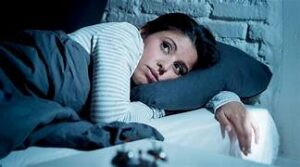Researchers from Brigham and Women’s Hospital found that people who naturally prefer to stay up late are more likely to have poor lifestyle habits.
A new study finds that “night owls” are more likely than “early birds” to have unhealthy lifestyle behaviors and an increased risk of developing Type 2 diabetes.
Being a night owl isn’t about staying up late to party. It’s about a person’s circadian preference, or having a natural body clock that is partly genetically set to stay up late. That means night owls are wired differently from people who seem to automatically wake up at the crack of dawn and nod off at an early hour.
An analysis of data from more than 60,000 female nurses participating in the Nurses’ Health Study II revealed that night owls were more likely to consume unhealthy diets, to exercise less, to have a higher body mass index, to sleep fewer hours and to smoke cigarettes than the early birds, according to the report published in the Annals of Internal Medicine.
Night owls were more likely to develop diabetes — about 19% after the researchers accounted for the impact of unhealthy habits associated with being a night owl. And that means there may be something about wake and rise times being shifted later that raises the risk of diabetes.
“A 19% increased risk, after adjusting for other factors, is a strong risk factor,” said the study’s senior author, Tianyi Huang, an assistant professor of medicine at the Harvard Medical School and an associate epidemiologist at the Brigham and Women’s Hospital in Boston.
Among the women in the study, 11% reported they were night owls, while 35% said they were early birds. The rest, around half, didn’t identify strongly as either a morning or evening person.
The new research is the latest evidence to show that being a so-called evening chronotype — or feeling more energetic at night — can be hazardous to your health. Previous research has linked being a night owl to obesity and heart disease.
Huang suspects the risk linked simply to being a night owl is due to a person’s chronotype being out of sync with their environment, in particular, their work schedule. “So, many night owls go to bed late but have to get up early in the day to work,” he said. “In our study we found that among people with an evening chronotype who did night shift work there was no association with an increased risk of diabetes.”
Marie-Pierre St-Onge, director of the Center of Excellence for Sleep and Circadian Research at Columbia University Vagelos College of Physicians and Surgeons, said if it’s not possible to find jobs that can be done later in the day, then people with late-night body clocks need to be careful about their lifestyle habits.
“If you are able to eat healthy, sleep well and be physically active, you’re at a lesser risk,” St-Onge said.
While some night owls do manage to switch their sleeping patterns because of life events, such as having children, “they tend to revert back,” St-Onge said. “You can’t fight your body.”
Huang agreed. “Some people may have a very strong genetic influence for having an evening chronotype. That is what makes it very hard to alter,” he said.
St-Onge suspects that some humans evolved to have an evening chronotype because there was a “need for some people to be vigilant at night, when others could not be, and that way there could be a 24-hour coverage in terms of safety.”
The new study is “really interesting,” but it doesn’t prove that the evening chronotype causes an increased risk of diabetes, said sleep specialist Dr. James McGuirk.
Another limitation of the study is that it was made up of mostly white women, said McGuirk, an assistant professor of neurology at the Vanderbilt University Medical Center in Nashville, Tennessee. McGuirk is not associated with the new research.
A lot of the people McGuirk sees in his clinic have an evening chronotype.
“They really feel they should go to bed early,” he said. “They think they have insomnia. But they’re just working against an internal chronotype.”
Source: NBC News










